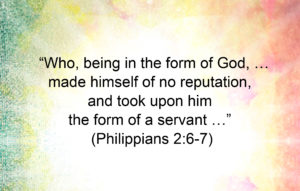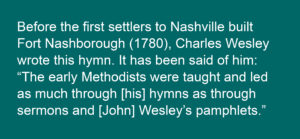 Tuesday, April 7 | by Sandy Fields
Tuesday, April 7 | by Sandy Fields
(Charles Wesley, 1739 – CGH #605)
Listening to my first Easter cantata as a 28-year-old recently converted Christian, Charles Wesley’s hymn, And Can It Be, spoke everything I was feeling.
“Amazing love! How can it be that Thou, my God, shouldst die for me?”
Overcome with the extravagant grace that was evident in my own salvation, I grieved that I caused His death. I was responsible for His pain. The One whose death I caused through my sins offered His life for me! That first Easter, I heard the same amazement in Wesley’s words. It was personal – my God freely died in my place.
“He left His Father’s throne above (so free, so intimate His grace),
emptied Himself of all but love …”
 Wesley’s words speak to the Greek underlying Philippians 2:7. The phrase “made himself of no reputation” (KJV) literally means “he emptied himself.” The never-ending mercy of God, and His willingness to empty Himself, is the source of this Amazing Love.
Wesley’s words speak to the Greek underlying Philippians 2:7. The phrase “made himself of no reputation” (KJV) literally means “he emptied himself.” The never-ending mercy of God, and His willingness to empty Himself, is the source of this Amazing Love.
The hymn continues to remind me of the result of Christ’s loving, merciful work. My sins are not minor, but there is no condemnation for me. I am alive in Christ and clothed in His righteousness! I can approach the throne with boldness!
I remember this hymn when I start to take for granted that I have been “bought at a price.” “Amazing love! That Thou, my God, shouldst die for me!”
Thank you, my Lord and my God. May I never trivialize Your sacrifice as I
will be eternally grateful for Your suffering and death on the cross to reconcile me with You!
Listen to the song online:
